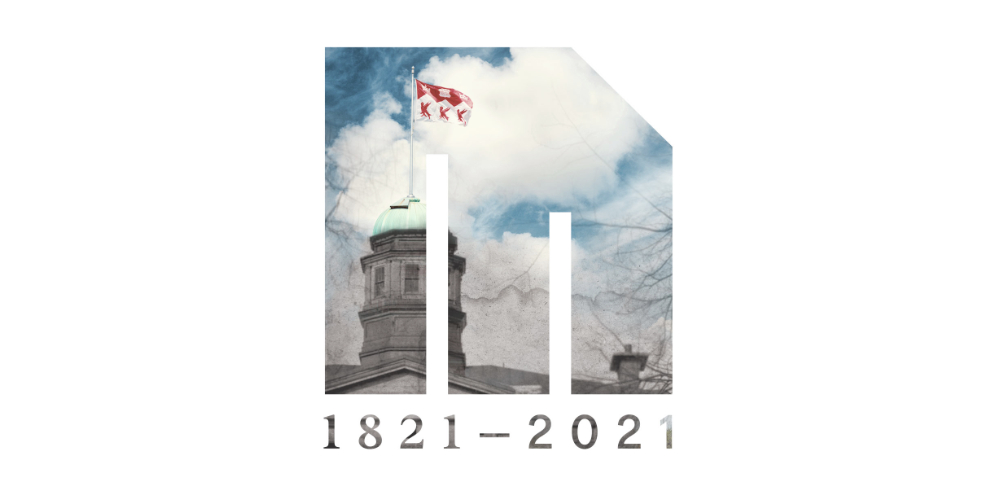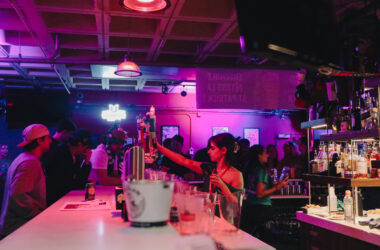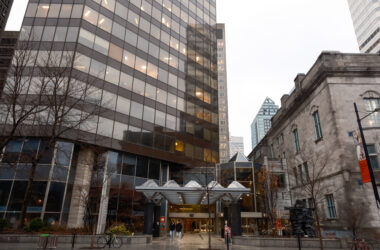McGill kicked off its bicentennial (1821-2021) celebrations on March 31 by broadcasting its centrepiece event, “Celebrate 200: Launching Our 3rd Century,” live from the university’s bicentennial website. Laurent Duvernay-Tardif, MD ‘18, a frontline healthcare worker and professional football player, and Heleena De Oliveira, U3 Arts and president of the Black Students’ Network (BSN), hosted the event and also took part in 200-second challenges dispersed throughout the program.
In her opening remarks, De Oliveira recognized Shakorennawis Doxtador-Swamp, Oneida and Bear Clan, who performed the Iroquois social song “Rabbit Dance” during the land acknowledgement, and reflected on her time as president of the BSN.
“I just want to take a small moment to thank the Black and Indigenous [communities] of McGill,” De Oliveira said. “Without them, we would not have reached where we are today, celebrating our 200 years.”
The festivities began with a screening of McGill’s official bicentennial video, followed by greetings from three of McGill’s Principals Emeriti, including the Right Honourable David Johnston, Bernard Shapiro, and Heather Munroe-Blum. Munroe-Blum, McGill’s first female Principal and Vice-Chancellor, serving between 2003-2013, paired her celebratory remarks with a commitment to community service.
“As we celebrate, I hope we will all commit to making McGill even better by lifting our collective aspirations toward the highest standards of service to all humanity,” Munroe-Blum said.
After the greetings, De Oliveira and Suzanne Fortier, McGill’s Principal and Vice-Chancellor since 2013, shared a conversation, discussing their respective experiences at McGill. Having been a student at the university before eventually becoming its Vice-Chancellor and Principal, Fortier said she had noticed the culture at McGill change over the years.
“There are three words that come to my mind,” Fortier said. “Open, connected, and purposeful. I do not think I would have used those words when I was a student here 50 years ago.”
Looking ahead to its third century, Fortier was confident that student initiatives would propel the university to greater heights.
“When I see all that is going on around campus, particularly with our students and all the initiatives they launch, […] they are ready to shape the future,” Fortier said.
A musical interlude followed the conversations, featuring performances by Schulich School of Music alumni Jason Beck, B. Mus ‘94—who performs under the name “Chilly Gonzales”—and Beatrice Deer, an acclaimed Mohawk and Inuk artist who was a distinguished guest at McGill’s Indigenous Awareness Week in 2018.
Following the musical performances, Michael Loft, retired academic associate at the McGill School of Social Work, recalled his time working for the faculty.
“Some 45 years ago, McGill made room for a young Kahnawake Mohawk recently returned home from a three-year hitch in the U.S. Marines, and gave me the tools to build a rewarding career in the social work field,” Loft said. “I am confident that the Indigenous presence [at McGill] will grow exponentially in the coming years.”
Thomasina Phillips, Kanienkehaka from Kahnawake, interim manager at the First Peoples’ House, and social worker at the McGill Wellness Hub, echoed Loft’s thoughts and offered her vision for the future of Indigenous presence at McGill.
“Inclusion is a very first important step in reaching a critical mass of Indigenous peoples within the university,” Phillips said. “By 2071, what I would hope to see is the inclusion of Indigenous knowledges and ways of life in every part of the university.”
Beyond boosting Indigenous inclusion and enrollment, Phillips hopes that McGill will foster relationships with Indigenous communities in the coming years.
“What I would hope to see are partnerships with communities that support the initiatives of those communities, around language, revitalization, kinship, [and] caring,” Phillips said.
For the event’s final musical performance, the Christine Jensen Small Ensemble performed “I Feel Foolish” from the Schulich School of Music, and a string of clips featuring alumni sending birthday wishes to McGill led the program to a close.










